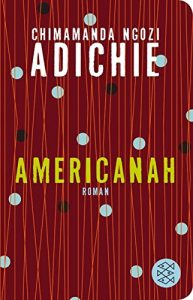Did You Say „African Literature“?

Writing books in a quiet little room, winning international literary prizes and then disappearing into oblivion is not her thing. Chimamanda Ngozi Adichie is the star among Nigeria’s writers and is on a mission. She has become the icon of a polyglot, ethnically mixed generation of young women who move effortlessly between cultures with a few swipes. They are committed to women’s rights and greater social justice around the world. They firmly oppose all forms of sexism and racism. Adichie is a real role model and has an enormous reach thanks to social media. Her TED talk „We should all be feminists“, for example, has attracted 7.5 million viewers to date. Anyone who hears the charismatic Chimamanda Ngozi Adichie speak on YouTube or live on stage will immediately understand why she has so many fans.
A gifted writer and activist:
Her mind is razor-sharp – and so is her language.
She lays the truth on her audience without warning and in a gentle voice. She mercilessly exposes deep-seated prejudices or the unthinking way of talking about „Africans“ and „blacks“. At the same time, however, she also invites us to take a closer look, immerse ourselves in her view of things, and discover more.
Change your perspective
and recognize yourself in the process.
Time and again, Adichie enables a change of perspective: it is a look through the keyhole into an unknown, multi-layered society with unwritten rules and laws. She takes her readers into the world of everyday racism and sexism, entirely effortlessly, almost casually.
Here, she is seen as an inferior migrant from the ex-colonies, and her social status takes another turn for the worse. In the Nigerian diaspora, however, things are not precisely squeamish among themselves either. Origin, education and, above all, the tribal arrogance of the black community make some more equal than others. Back in Nigeria, they are no longer the same. She is the ‚Americanah‘ who has lived a little too long in the USA for the taste of those who stayed at home and, therefore, no longer wants to fit in.
Perhaps it is precisely this socio-political dimension that makes the book an exciting and worthwhile read. At the same time, „Americanah“ is an impressive coming-of-age novel that tells the story of a deeply felt love between two young people. It is a love that gradually spirals into silence and oblivion in the maelstrom of missed opportunities and tragic events. However, it survives and, deep down, sings the song of love.
Adichie is a feminist in the best sense of the worde.
Her credo: a feminist believes in people’s political, social and economic equality. And as long as this is not the case, we do not need to rest on our laurels. Men AND women should become feminists. Only then can something come of it.
Changing the world from Nigeria.
Chimamanda Ngozi Adichie was born in Enugu, Nigeria, in 1977. She grew up in a thoroughly academic environment. Her father was a professor of statistics at the University of Nigeria, Nsukka, and her mother was the first woman to become chancellor of the university. At the age of 19, she moved to the USA to attend Eastern Connecticut State University, where she graduated summa cum laude with a degree in communications and political science. Followed later by a Master’s in Creative Writing at Johns Hopkins University and a Master of Arts in African History at Yale University.
Incidentally, Chimamanda Ngozi Adichie thinks little of the term „African literature“. What should that be? She sees herself as a writer from Nigeria and naturally has her cultural roots there. This includes knowledge of great authors such as Chinua Achebe, Wole Soyinka and Ola Rotimi, to name but a few. However, all these greats did not write „African literature“. They are Africans who are great writers and have created outstanding works. It is all a question of perspective.
___
The article appeared first as a guest article on feinschwarz
Book: „Americanah“ by Chimamanda Ngozi Adichie, novel, 2014, S. Fischer Verlag, €15.00.
Image 1: Author Chimamanda Ngozi Adichie; Photo: (C) Manny Jefferson

